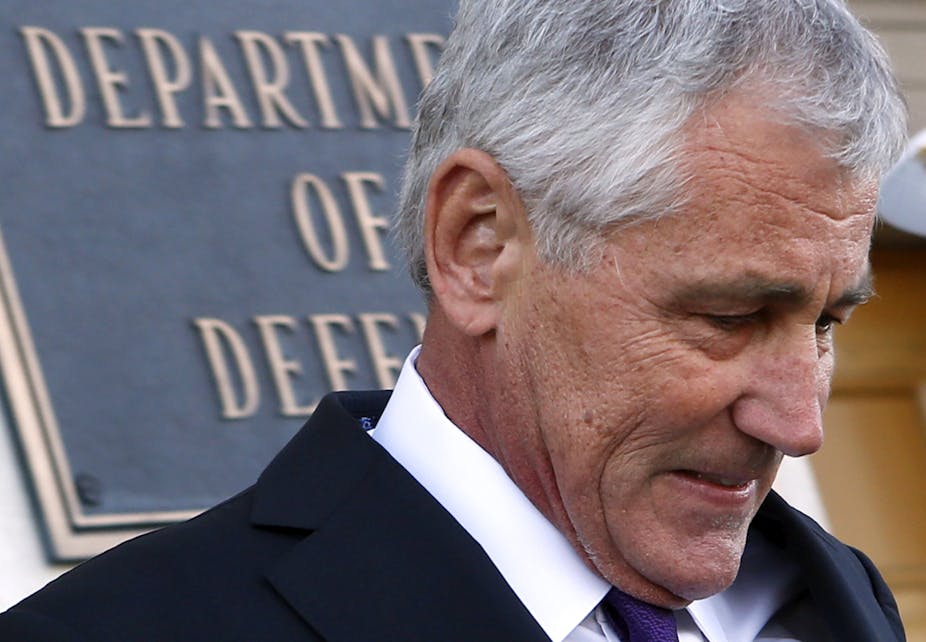Even if the decision was intended to placate his critics within the military and the White House staff, Chuck Hagel’s resignation as Secretary of Defense could not have come at a worse time for the Obama administration.
The White House is currently mired in controversy over its policies in Iraq. It has been criticized for its recent environmental agreement with China. And the President faces the threat of legislative paralysis because of his executive action regarding America’s burgeoning undocumented immigrant population.
Even if Hagel’s resignation was by mutual agreement, critics will seize upon the decision as evidence of a White House in disarray. Sacrificing this particular lamb to demonstrate the administration’s resolve could backfire. Foreign policy is conventionally regarded as the last refuge of presidents as their administrations wind down. For President Obama, it is turning into one hot potato after another.
Difficult beginnings
Certainly, Hagel’s selection was well intended. As the 24th Secretary of Defense, he was the first that had served as an enlisted soldier. As a Republican, he allowed the President to demonstrate his bi-partisan proclivities. But as a tactic, his supposedly non-controversial selection immediately back-fired as Hagel encountered a difficult Congressional confirmation process.
Following in the footsteps of Donald Rumsfeld, Robert Gates and Leon Panetta was never going to be easy. Each of them was an authoritative and notable public figure in their own way. Hagel, in contrast, cut an amicable, mildly spoken figure. Sadly, this is considered a weakness in Washington’s contemporary halls of power.
So his tenure was bumpy from the outset. Hagel’s, at 635 days, did outlast Panetta’s (at 608). Yet even as a former senator he lacked the charisma and political weight of his predecessors. Hagel was often seen as too passive. He lacked the communication skills the Pentagon felt it badly needed given the personalities of President Obama’s other senior foreign policy officials. John Kerry is occasionally mocked for his formal style but remains widely respected and regarded as an effective Secretary of State. Susan Rice and Samantha Powers are both at times more aggressive in their approach but retain the President’s confidence. In contrast, Hagel cut a slightly forlorn and increasingly isolated figure.
Hagel’s primary responsibilities at the outset were clear. First, he was to supervise winding down the wars in Afghanistan and Iraq. Second, he was to cut the military’s budget given the requirements of sequestration. As a former soldier, he was in principle well placed to supervise these complex processes.
Changing mandates
But his mandate in both areas changed abruptly during his time in office and he had difficulty making the transition. The Pentagon’s major budget cuts never materialized. The Islamic State’s victories in Iraq and Syria caused the administration to reverse its position on Iraq. And if last week’s report in the New York Times is to be believed, President Obama is revising his position on deployments in Afghanistan. Hagel’s skills in managing such wars were limited. He was caught in the crosshairs of a president seeking to fight a limited war through airstrikes and counterinsurgency, and the members of the Joint Chiefs of Staff who favored comprehensive military engagement. His recent response, in suggesting that the Islamic State constituted one of the greatest threats to the United States in recent times, was a shrill over-statement. It is common in Washington to overstate threats in order to galvanize support – but is just the kind of thing we don’t need as a time when America has to marshal its resources effectively and prioritize its choices in an increasingly messy work.
Hagel’s successor will have to have an array of new skills if he or she is to manage those threats successfully. The growing needs for counterinsurgency and the declining importance of a capacity to fight ground wars require a reorganization of resources at the Pentagon. That is a difficult task at any time, most of all in the waning years of an administration facing a hostile Congress.
To his credit, Hagel attempted to remain a loyal member of the administration. Yet the varied leaks in recent months will inevitably raise a question mark over his loyalty, however unjustified at this point. In the short term he will be judged harshly. Depending, however, on his successor’s record, we may come in time to rewrite the history of his tenure as a relatively tranquil one at the Pentagon.

